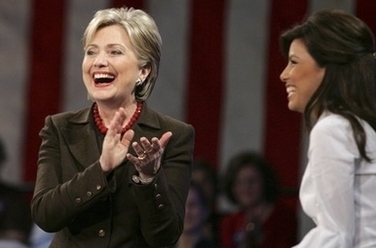Texas, Ohio could decide Dem nomination
Updated: 2008-03-04 11:09
WASHINGTON -- Barack Obama and Hillary Rodham Clinton reached for the finish line of contentious Ohio and Texas primary campaigns on Monday as senior Democrats expressed concern the party could suffer this fall if their struggle goes much longer.
"I'm just getting warmed up," said Clinton, looking beyond this week's contests and shrugging off 11 straight primary and caucus defeats as well as a three-digit deficit in delegates.
|
|
The former first lady campaigned from Ohio, where she accused Obama of double talk on NAFTA, to Texas, where her new television commercial questioned his readiness to serve as commander in chief.
Obama spent his day in Texas, a state rich in military bases, where he pledged to begin the withdrawal of US troops from Iraq next year and envisioned a "seamless transition from active duty to civilian life" for men and women who leave the armed forces.
"Nobody reached out to the Canadians to try to assure them of anything," he said at a news conference in Carrollton, Texas.
In addition to Texas and Ohio, Rhode Island and Vermont hold primaries on Tuesday. The four races have a total of 370 national convention delegates at stake.
Obama has won 11 straight contests, and leads in the Associated Press delegate count, 1,386-1,276. His margin is greater among delegates chosen in the primaries and caucuses, 1,187-1,035, while Clinton leads among party officials, known as superdelegates, 241-199.
Obama has been gaining ground among superdelegates in recent weeks as his victories have piled up, and Clinton's support has begun to erode.
At the same time, senior Democrats have begun to speak out in private as well as public about the impact a continuation of the bruising campaign might have in a fall confrontation with Sen. John McCain, the Republican nominee-in-waiting.
Several Democrats said the party's chairman, Howard Dean, told House Speaker Nancy Pelosi and Senate Majority Leader Harry Reid last week he was concerned about the possible impact of a nominating campaign that stretched through the end of the primaries in early June. Dean also said that if the party is divided going into next summer's convention, it would remain that way afterward, even if the differences were papered over in the four days in Denver, these officials said.
Dean did not suggest any attempt to intervene. The Democrats who described his comments did so on condition of anonymity, saying they had been made in a private setting.
|
|
|
||
|
||
|
|
|
|







